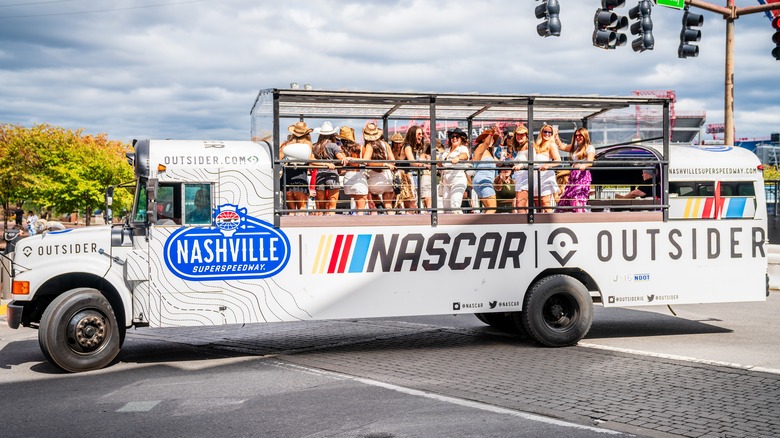Let’s get right to it, Nashville has a reputation — and that reputation comes with bargain-bin cowboy hats and neon-pink boots. For every legendary corner of Music City, there is a bachelor/ette party stumbling close behind. What is a gaggle of “woo-girls” or “hell-yeah-guys” celebrating the impending nuptials of their bestie to do? Why, rent a crudely modified school bus and crawl through downtown — obviously.
So Lower Broadway after dark looks less like a thoroughfare and more like a neon-lit conga line on wheels. These “transportainment” rigs are a major part of modern Music City, and the lingering spirits of Johnny Cash and Hank Williams must love hearing Katy Perry cranked to 11 as they inch past the Ryman Auditorium. After all, some of these rolling Franken-buses have lost their original roofs, gained LED lights, and — memorably in one instance, sprouted a functional hot tub ensuring the patrons weren’t the only things getting sloshed.
With Nashville making more traffic stops per capita than the national average, the whole scene raises the question: Are these things actually legal? The short answer is a heavily-asterisked “yes.” The long answer is a master class in regulatory whack-a-mole, public outcry, and the sheer, unadulterated chaos that defines modern Nashville.
From school bus to booze cruise: The anatomy of a Nashville party machine
If you can dream it, and it has wheels, someone in Nashville has probably turned it into a party bus. The baseline model for many of these operations is the humble school bus — its roof unceremoniously chopped off like these other custom drop-top mods. The iconic school bus yellow is usually covered up and the interior gutted to make room for benches and dancing. But why stop at school buses? The selection includes an entire menagerie of vehicular oddities.
You’ll find massive, open-air vehicles built on agricultural tractor chassis giving hayride vibes. Even retired military surplus trucks. One of the most infamous examples? That trailer outfitted with a full-size, fully operational hot tub — which the city eventually shut down. Not for the glaring safety hazard of sloshing around in a mobile human crock pot, but because it lacked a public pool permit. These creations are a testament to backyard engineering. It’s the kind of thing you’d admire at a post-apocalyptic car show, but perhaps be less enthused about when it’s blocking an intersection or holding up traffic.
The long, winding, and poorly paved road to regulation
For years, Nashville’s party bus scene was the Wild West on wheels. If you could bolt a bench and a cooler to a chassis, you could charge tourists for the privilege of riding it down Broadway. One Tennessee twist helps explain how these rolling parties even exist: the state’s open-container law, which lets passengers in a moving vehicle possess and consume alcohol — as long as the driver stays dry. With recent estimates pegging Nashville’s transportainment industry at around $50 million a year, it’s easy to see why so many are eager to cash in on the rolling chaos.
Due to a series of unfortunate events — including a man falling from a moving bus and being run over — the city was forced to act. As Butch Spyridon, president/CEO of the Nashville Convention & Visitors Corp., told WSMV 4: “What we feared would happen, did happen.” This spurred the creation of a regulatory framework for the buses. Why nothing was done before is still mystifying.
To be a legitimate rolling party — besides singing “Don’t Stop Believin'” off-key — now requires operators to get approved for an entertainment transportation certificate. This comes with a laundry list of rules: no booze over 8% alcohol by volume and noise levels that shouldn’t be plainly audible from 50 feet away. There are also operating-hour restrictions, and drivers are supposed to have a commercial driver’s license. Yet, with 88 citations handed out in one six-month period — 61 of them for operating without a license — it’s clear that not everyone is playing by the rules.
Residents vs. revelers: The party bus standoff
While tourists ride high on a cloud of booze and Bluetooth speakers, many Nashville locals are just trying to get a quiet night’s sleep — or, you know, use the street without being blasted by Lizzo at 3 p.m. on a Thursday. The backlash has been loud and sustained. More recently, the Music City has been in tune with the complaints — pushing further regulations. Setting designated quiet zones — such as schools, daycares, places of worship, and healthcare facilities. The new rules also prohibit pick-ups and drop-offs along those areas.
What’s made things worse? A lingering sense that enforcement is selective at best. Some operators allege the city is trying to shutter their businesses outright, while others — like Old Town Trolley Tours, a booze-free sightseeing operation — allegedly received “verbal permission” to operate during otherwise restricted hours. That special treatment didn’t sit well with party bus crews. It’s created an us-versus-them climate, echoing other car-culture battles like the Carolina Squat.
Are these rolling honky-tonks legal? Technically, yes — if you’ve got the permits and play by the city’s rules. You thought you were getting the full “In the Air Tonight” drum solo, but it’s just the sad comedy rimshot of Music City. For now, the music blares on, though the wheels of regulation are turning, and they just might catch up with the party. So if heavy modification, high decibels, and a party atmosphere are your vibe — check out Monster Jam at Nissan Stadium instead.


